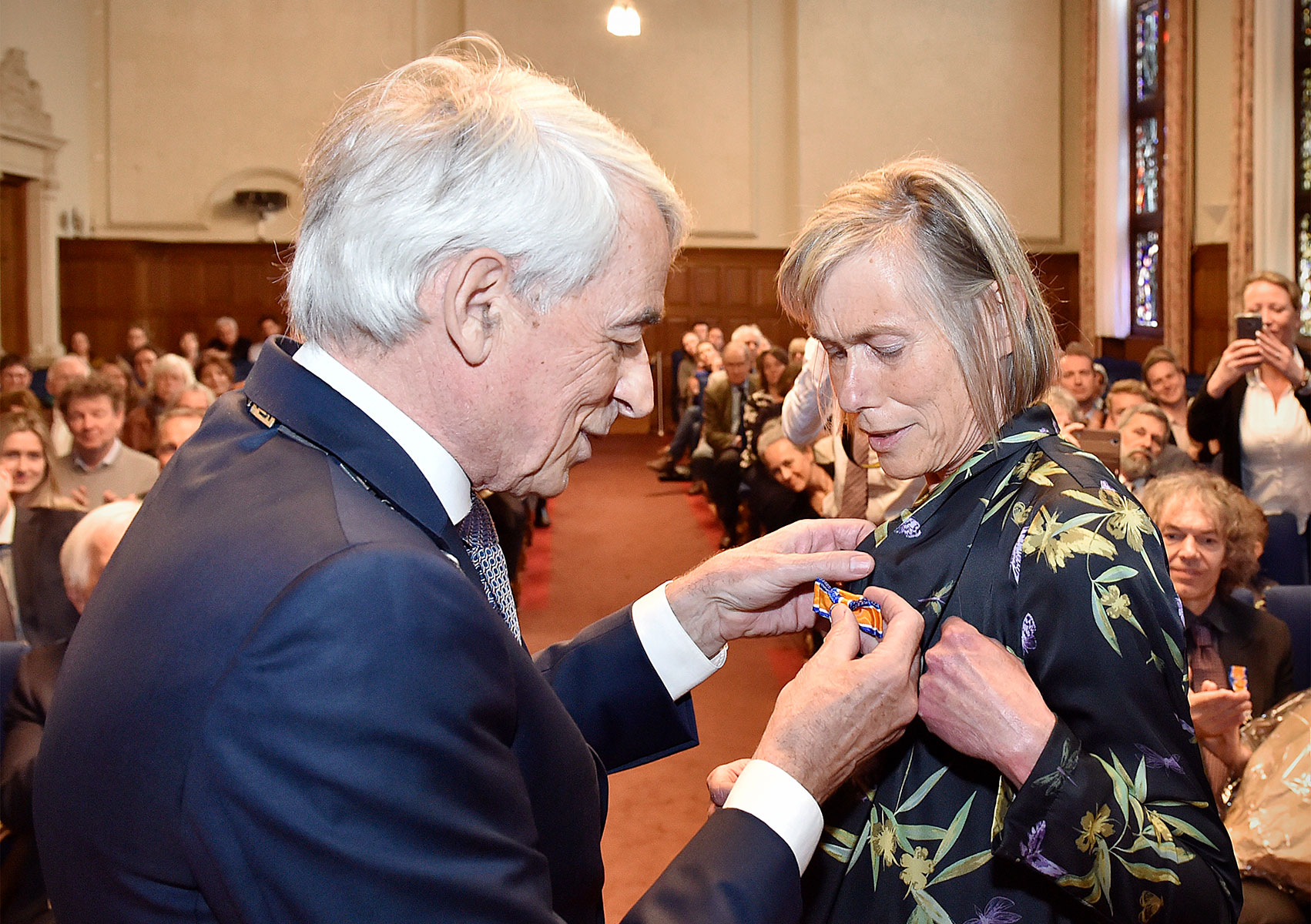Prof. Gerry Wakker appointed Officer of the Order of Orange-Nassau

On Thursday 26 April, Prof. Gerry Wakker has been appointed Officer of the Order of Orange-Nassau. Gerry Wakker (Haarlem, 1958), Professor of Ancient Greek Linguistics and Dean and Chair of the Board of the Faculty of Arts, is a leading researcher, both nationally and internationally, and a unique, skilled and personally involved administrator. Like no other, she shows that she is perfectly at home in both worlds.
Leadership and personal involvement
Since she joined the Board of the Faculty of Arts in 2003 and was appointed Dean in 2009, Wakker has embodied academic leadership: she always shows that she is both an administrator and an academic. Academics who have worked closely with her praise her broad-mindedness, precision and genuine modesty. Her approach has radically changed the way people think about Greek linguistics. Fellow administrators admire the outstanding expertise and commitment with which she has brought about complex change processes. She has introduced various change processes and innovations to the Faculty’s teaching and organization, while always demonstrating her unconditional commitment to the welfare of the students and staff. Her administrative commitment and personal involvement is praised by all. She is competent, driven, disciplined and meticulous. While she sets the bar high for herself, others can be only human. She demonstrates compassion for others but is clear and consistent in her professional communication. It is to her credit that despite their high workload her staff are motivated and work passionately to achieve the changes needed at the Faculty.
Faculty in motion
Under Wakker’s leadership as Dean the Faculty has grown rapidly. She has introduced new degree programmes and brought about organizational change with great zeal and expertise. Immediately after she joined the Faculty Board she became involved in introducing the Bachelor-Master structure to the programmes; the Faculty of Arts was a forerunner in this at the UG. As interest in the traditional language degree programmes dwindled, it became clear that a complete update of the Faculty’s programmes was necessary. Under Wakker’s leadership the decision was made to transform the traditional modern language programmes into the new European Languages and Cultures programme that offers students a choice of six modern languages alongside English and Dutch. The new programme is very popular with students. Wakker has also fought to keep the Greek and Latin Language and Culture programme at the UG. Losing this programme would have a lasting effect on the availability of well-trained classics teachers for secondary schools in the north.
Efficient organization
The Faculty of Arts is constantly challenged to ensure that the curriculum reflects societal, social and demographic developments, the internationalization of university teaching and research, student interests and the job market. A healthy financial administration is crucial to ensuring that student numbers remain constant and education processes flexible. Under Wakker’s leadership the administration of a large number of departments has been transferred to five clusters. The modelling and implementation of the new organizational structure was a major administrative challenge that she skilfully negotiated. With her profound knowledge of teaching, research and operational management she encourages constructive consultation with the Faculty Council. It is due to her exceptionally proficient leadership that a modern faculty has been created.
Wide range of administrative duties
Wakker willingly makes her excellent administrative skills, experience and knowledge available to the entire University as well as to national institutions and teaching and research bodies. As Vice Rector she bears administrative responsibility for such matters as the PhD Regulations and the appointment policy for professors. As one of the two Chief Diversity Officers she is untiring in her efforts to achieve a more balanced male-female ratio among the academic staff . S he is in demand at home and abroad for her expertise and administrative experience in monitoring the quality assurance of academic teaching and research. She is active in the national and international arena as an adviser on assessment committees and a member of the board of QANU, an evaluation agency that organizes and carries out teaching and research assessments at Dutch universities. In her own discipline she has demonstrated great commitment as chair of Disciplineoverleg Letteren en Geschiedenis, a meeting of the deans of faculties of arts in the Netherlands. Here she has championed the role and funding of all humanities faculties in the Netherlands. She strives to ensure that the classics continue to be taught at Dutch universities and find ways to overcome the shortage of secondary-school classics teachers.
Golden generation of Dutch classicists
As an academic Wakker has earned considerable national and international scholarly renown over the years in her own discipline of Greek linguistics, in which she specializes in the most complex aspects of Greek grammar . She belongs to the golden generation of Dutch classicists who have given Greek and Latin linguistics a new linguistic foundation and have thus earned global recognition and fame. She has gained international acclaim for her contributions to English, French and German academic journals, and has contributed to the eight volume Hellenistica Groningana series. She has also made various contributions to Greek teaching at universities and secondary schools. Her love of the discipline is apparent from her work for the Kosmos exam volume and course. She has thus built bridges between academia and the public. She has always managed to combine her difficult job as Dean with teaching on the Greek and Latin Language and Culture programme. It is her commitment to the teaching and research that makes her able to translate decisions to the organization.
More news
-
14 February 2026
Tumor gone, but where are the words?
-
19 January 2026
Digitization can leave disadvantaged citizens in the lurch
